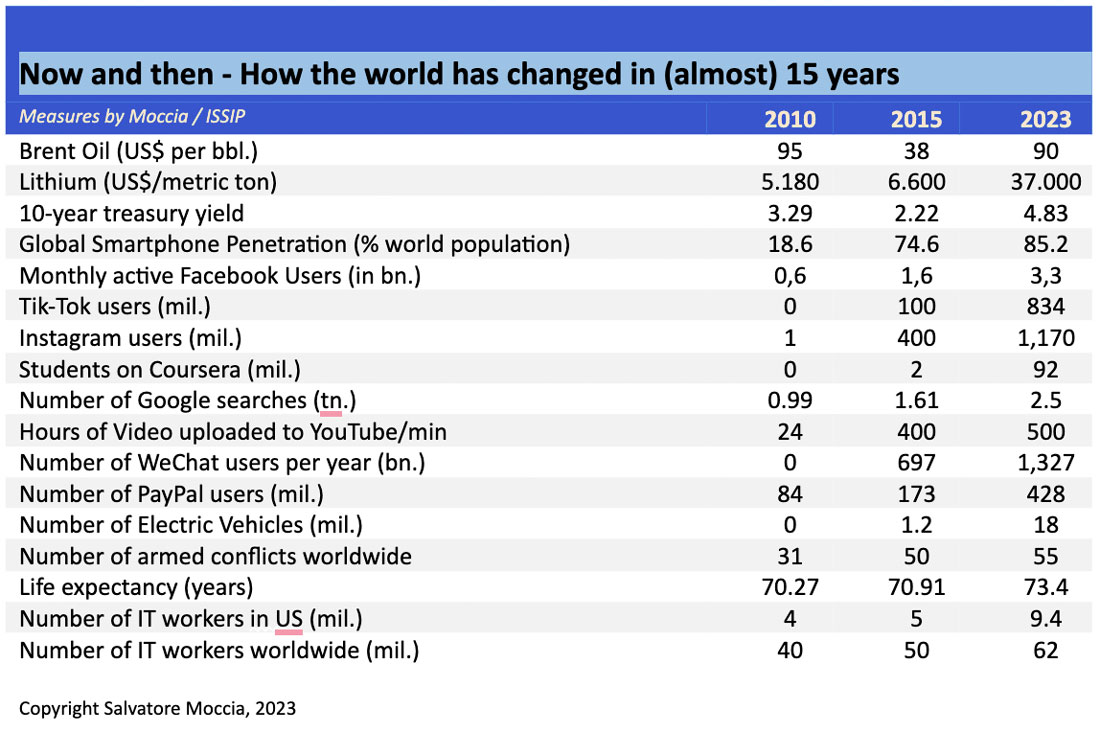by Prof. Dr. Salvatore Moccia
Happy to be back here and full of energy for the new year. My last newsletter as ISSIP Editor-in-Chief was in December 2019. Now we are in 2024. How has the world changed in (nearly) 15 years? Let’s take a look at a table I prepared – to which I would welcome your inputs! Let’s add more and more elements to it this year.

In my first newsletter I used a quote by Lewis Carroll’s, Alice in Wonderland: “my dear, here we must run as fast as we can, just to stay in place. And if you wish to go anywhere you must run twice as fast as that.”
As Professor of Strategic Management, I have a moral obligation to analyze strategic forces to understand possible impacts and develop plans for the future. I am proud to say that I was able to correctly forecast the election of a Pope from Argentina and more recently, predicted Argentina winning the Soccer World Championship.
But it does not always work… Going back to the rapid and chaotic change underway, firstly, I strongly believe that, to better understand what the new year will bring, we should introduce changes to our mental models. Let’s start from one of the most used: the VUCA principle.
Expanding the VUCA principle
The U.S. military coined the acronym VUCA (volatility, uncertainty, complexity, and ambiguity) in the late 1990s, reflecting the shift from traditional ‘Cold War’ models of thinking and planning for more asymmetric conflicts. As business leaders were attracted to its characteristics, over time the VUCA principle became a significant tool in assessing strategy and innovation.
As we saw in the table above, today’s world is completely different from that of the late 1990s. The world in which today’s organizations operate has become not only riskier but also more volatile, uncertain, complex, ambiguous, fast-moving and interdependent.
I strongly believe that two more dimensions should be added to the VUCA principles: Rapidity and Interdependence, moving from VUCA to VUCARI. Strategic competencies and managerial skills must change right alongside changing environments: stakes are high. To devise a winning strategy, begin by assuming an extreme VUCARI environment.
Rapidity
According to Hamel, we live in a world that seems to be all punctuation and no equilibrium, where the future is less and less an extrapolation of the past. Change is multifaceted, relentless, seditious, and occasionally shocking. In this maelstrom, long-lived political dynasties, venerable institutions, and hundred-year-old business models are all at risk. Today, the most important question for any organization is this: are we changing as fast as the world around us? Look again at the table above. Each single entry depicts transformative change over the time period.
Interdependence
In today’s world, no nation exists in economic isolation. All aspects of a nation’s economy are linked to the economies of its trading partners. This linkage is characterized by rising world trade in goods and services, increasing flows of cross-national finance (including banking, stock market transactions, and corporate acquisitions), greater legal and illegal, cross-national labor migration, accelerated international transfers of advanced technologies, expansion of multinationals, and mounting influence of major global economic institutions such as the International Monetary Fund, the World Bank, and the World Trade Organizations. All of these changes enhance the interdependence of national economies.
So, what does this mean for the new year and what’s next?
My dear friends, the future is really not predictable, but there are still steps we can take. Let me share with you the F-Cube formula that I developed for my students:
- Future: the past is important, but we are called to live in the future. Build it!
- Foresight: the future is not predictable, but if you don’t move, nothing will happen. Move!
- Fly: creativity and innovation are still part of our human heritage. Use your brain!
Have a good New Year all!
Cheers,
Prof. Dr. Salvatore Moccia
Editor-in-Chief
